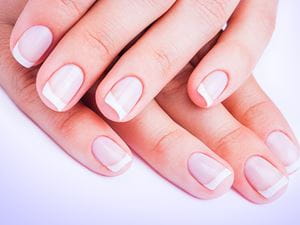
We spend so much time dressing our nails. We shine, buff and have them treated with oils and lotions. People spend over 600 million dollars yearly on polish and other art to make their nails look pristine. There are stickers, at-home gel manicures and 3D effects that are added to make them pop. However, they may look fabulous, but underneath all the shine there could be potential problems lurking. The status of your fingernails could indicate a bigger issue going in your body. It could possibly indicate disease and other ailments that you have missed. By checking for these abnormalities early on you could catch diseases and other illnesses early on before it becomes unmanageable.
Pale Nails
Anemia may be associated with pale or gray nails. Anemia is a treatable disorder that happens when a person has a low red blood count. The condition happens when the blood lacks enough healthy red blood cells or hemoglobin. “Anemia resulting from low levels of iron can lead to inadequate oxygen in the blood, which causes the skin and tissues to become pale," Shilpi Agarwal, M.D explained to Shape magazine. People can become lethargic since the organs are not receiving what they need to run optimally. Anemia is the most common blood conditions reported in the U.S. and it impacts an estimated 3 million people. You can take an iron supplement and start eating more foods with iron like red meat, leafy greens, beans, tofu and whole grains.
Yellow Nails
Nails when they age become more yellow or it could be from using nail polish for a long stretch of time. Smoking could also be a culprit. However, if they become frail and develop an infection from fungus, a bigger problem might be the cause. Nail fungus although a common condition, begins with a yellow spot at the tip of the fingernail and toenail. Chronic bronchitis, diabetes, thyroid disease or lung diseases could be a factor.
Brittle Nails
Author Dr. Mercola said that lifestyle also plays a role when it comes to brittle nails. If your hands are always in water or if you use polish remover frequently the nail can become brittle and lifted. However, brittle nails could indicate hypothyroidism or a fungal infection. "Mounting research shows that 10 percent to 40 percent of people living in the United States have suboptimal thyroid function," he said. There could also be a deficiency of vitamin A and vitamin B.
White Nails
Muehrcke's lines are spots or streaks that may extend across the nails and do not leave when the nail grows out. Causes of this can be from chemotherapy, kidney disease, liver disease or a lack of nutrients. A lack of albumin may also produce white nails. Low levels of this protein are made by the liver and if it is low it may cause these white lines to appear. Another reason for the lines is that swelling pushes against the "blood vessels that run underneath the nail, causing color changes," WebMD reported. If you suspect that there could be something serious, see you doctor and ask for a blood test.
Clubbed Nails
When your fingertips become larger and the nail becomes curved, it is called "clubbing." Clubbing is due to low oxygen in the blood, heart disease, liver disease or lung disease. These conditions could be causing the clubbing and it needs to be treated, so ask your doctor to run tests so you are armed with information. If you are diagnosed with a serious malady you can get a head start before it becomes chronic.
Horizontal Ridged Nails
Horizontal ridges can be caused by a high fever or injury that the body went through. "It can be from psoriasis, uncontrolled diabetes, circulatory disease, or severe zinc deficiency," Mercola shared. There is another line to watch for and that is Mees' lines. This is characterized by a discoloration that develops across the nails. It can be a consequence of Hodgkin’s disease, carbon monoxide poisoning, malaria or arsenic poisoning.
Pitted Nails
Nail pitting may look like small depressions in the nail. It is common with people who suffer from psoriasis. Psoriasis is an autoimmune disease that causes the skin to become red and scaly. Psoriasis may also develop on the scalp, on the elbows, on the knees, on the hands and on the feet. The condition can be treated with medicated ointments and creams. Nail pitting may also be caused by Reiter's syndrome. This is also called a "reactive arthritis." This happens when the body reacts to an infection in the body.
Spoon Nails
Spoon nails look like they have scoops and peel upwards. Medically it is referred as a growth disorder in the nail and is medically known as koilonychia. It can be caused by anemia or caused by heart disease.
If you believe that your nails are showing significant signs of being brittle, yellow, dented, pitted, or discolored--go to the doctor and get a lab workup. It might not be anything severe, but you will have more knowledge and a peace of mind that you investigated it further. You can't put a price on your health or your peace of mind.

